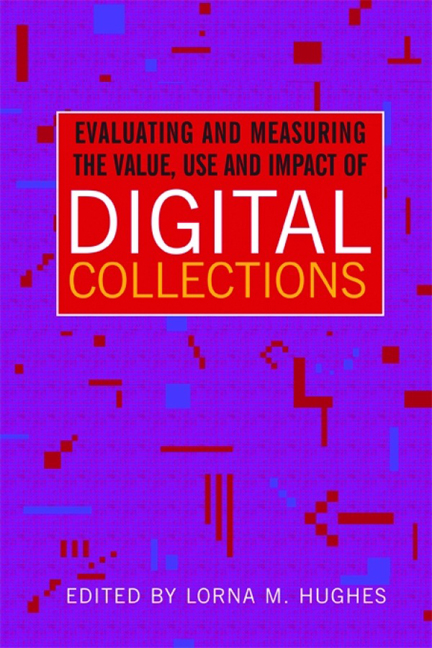Book contents
- Frontmatter
- Contents
- Figures and tables
- Foreword
- Acknowledgements
- The contributors
- 1 Introduction: the value, use and impact of digital collections
- Part 1 Digital transformations in libraries, museums and archives
- Part 2 Understanding and measuring the use, impact and value of digital collections
- Part 3 Enhancing the future impact and value of digital collections
- 9 Using ICT methods and tools in arts and humanities research
- 10 Creating a research data infrastructure: policy and practicalities
- 11 Improving sustainability of publicly funded digital resources
- References and further reading
- Index
- Miscellaneous Endmatter
- Miscellaneous Endmatter
11 - Improving sustainability of publicly funded digital resources
from Part 3 - Enhancing the future impact and value of digital collections
Published online by Cambridge University Press: 08 June 2018
- Frontmatter
- Contents
- Figures and tables
- Foreword
- Acknowledgements
- The contributors
- 1 Introduction: the value, use and impact of digital collections
- Part 1 Digital transformations in libraries, museums and archives
- Part 2 Understanding and measuring the use, impact and value of digital collections
- Part 3 Enhancing the future impact and value of digital collections
- 9 Using ICT methods and tools in arts and humanities research
- 10 Creating a research data infrastructure: policy and practicalities
- 11 Improving sustainability of publicly funded digital resources
- References and further reading
- Index
- Miscellaneous Endmatter
- Miscellaneous Endmatter
Summary
Introduction
In the course of its relatively brief life, the UK Arts and Humanities Research Council (AHRC) has funded a considerable number of digital resources in the arts and humanities (A…H), far more than any other UK public funder or charity. Established in place of the previous Arts and Humanities Research Board (AHRB) in 2005, alongside the other, existing UK research councils, each of which has its specific subject domain, the AHRC is easily the most important source of research project funding for the UK A…H (for more information about the AHRC, see www.ahrc.ac.uk). Most of this funding, from both the AHRC and its predecessor, AHRB, has gone to projects that have produced outputs in the form of conventional print publications; what is not always realized is how many of the funded projects have also produced digital research resources, either alongside print publications or as their sole or main output. This chapter starts with a review of almost all the digital resources produced by these projects for the ten years from 1999 to 2009, in order to give an idea of their nature, and then discusses the sustainability and related issues to which they give rise. Virtually all of them are data or content resources rather than digital tools; the AHRC has funded the production of digital tools, but only to a very limited extent.
Review of resources with digital outputs
The data that follows was collected in the course of a survey I led in 2009–10, in collaboration with the King's College London Centre for e-Research and the UK Network of Expert Centres in the digital A…H (see www.arts-humanities.net/noc), and funded by the AHRC. Our information was incomplete for the earlier part of 1999, and did not go beyond the early part of 2009, but otherwise was sufficient for us to identify with reasonable confidence all the projects whose outputs included digital research resources. This was possible because during the period covered all project grant applications with planned digital outputs were required to complete a technical appendix (which we shall return to later); starting from the projects thus identified, we were able through a process of desk research and direct enquiry to separate out all the projects where the digital output constituted a research resource, as opposed, for instance, to a project information web page.
Information
- Type
- Chapter
- Information
- Publisher: FacetPrint publication year: 2011
Accessibility standard: Unknown
Why this information is here
This section outlines the accessibility features of this content - including support for screen readers, full keyboard navigation and high-contrast display options. This may not be relevant for you.Accessibility Information
- 1
- Cited by
